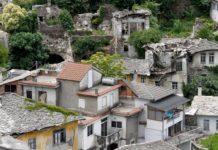Israel’s relentless war on EU humanitarian aid to Palestine
Women from the Palestinian village of Jubbet adh Dhib are fighting for basic amenities like electricity. Their struggle is part of a bigger tug-of-war, between European Union donors and Israel over the West Bank’s Area C.
JUBBET ADH DHIB, West Bank — In Jubbet adh Dhib, a small Palestinian village perched atop a steep hill south of Bethlehem, women say it’s them who call the shots.
Founded about two years ago, the 22-member women’s association stepped in to improve living conditions for the underserviced village with 162 residents; most of the men work in Israel as day labourers.
Before any plans can be implemented successfully, the women — directly or indirectly — have to grapple with the Goliath that is the Israeli administration.
I’tidal al Wahsh, one of the association’s leaders, is part of the small group that has gathered at the local nursery, which occasionally doubles up as the women’s association headquarters.
The spirited 34-year-old is proud to have played a part in the introduction of round-the-clock electricity to the village in November 2016 — the first time since its establishment in 1929.
Jubbet adh Dhib is located in Area C — under Israeli control — comprising roughly 60 percent of the West Bank. While Israel recognises the existence of the village, residents are not allowed to build on their land or expand their homes.
I’tidal, who grew up in the village, tells TRT World she saw transmission towers being erected in the Israeli settlement of Sde Bar, barely 500 metres away, even before the government gave it official status in 2005.
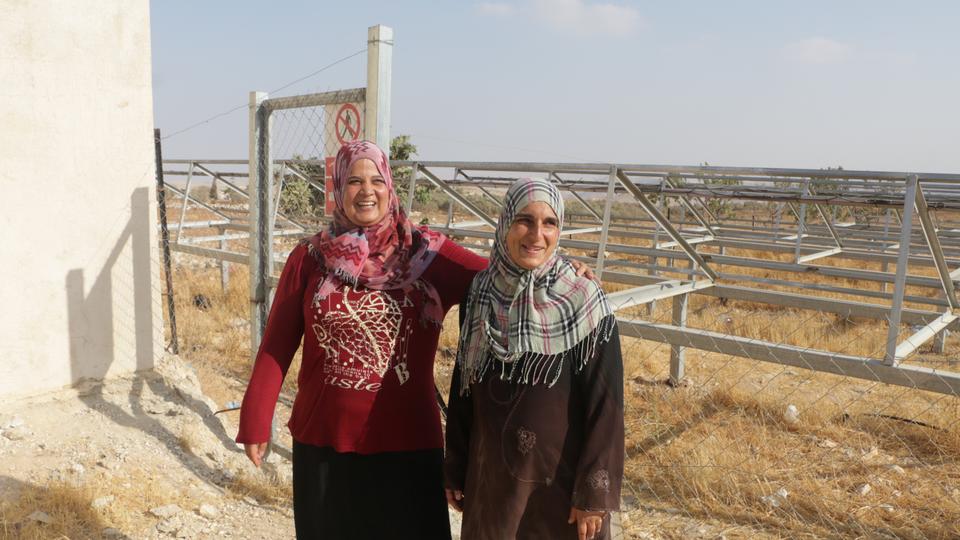 I’tidal al Wahsh (L), one of the women association’s leaders, grew up in Jubbet adh Dhib and says she saw transmission towers being erected in the Israeli settlement of Sde Bar, barely 500 metres away before it received official status in 2005. (TRTWorld) (Ylenia Gostoli)
I’tidal al Wahsh (L), one of the women association’s leaders, grew up in Jubbet adh Dhib and says she saw transmission towers being erected in the Israeli settlement of Sde Bar, barely 500 metres away before it received official status in 2005. (TRTWorld) (Ylenia Gostoli)
Jubbet adh Dhib has been filing requests to be connected to the electricity grid since the late eighties. These have repeatedly been rejected by the Israeli Civil Administration — the military body in charge of civilian matters in the West Bank — on grounds the village has no outline plan, which determines what a specific land is used for.
When residents submitted an outline plan for the village, this too was rejected.
Eventually, it was the women who carried out negotiations with Israeli-Palestinian green energy non-profit Comet-ME to install solar panels, funded by the Dutch government. Jubbet adh Dhib’s residents were finally able to get their own clean, sustainable source of energy last year.
But that didn’t last long. Residents were still recovering from June’s Eid festivities when Israeli forces drove into the village one early morning and confiscated 96 solar panels and related electronic equipment — a mere seven months after installation.
“They gave no notice. Everyone was sleeping when they arrived,” Amneh Daoud, 38, recounts as she sits with I’tidal and other women in a room adorned with children’s drawings and artwork.
“When we realised, all of us [from the association] went out and tried talking to the soldiers, we tried to prevent them from taking them away. We were told they had no licence,” she adds.
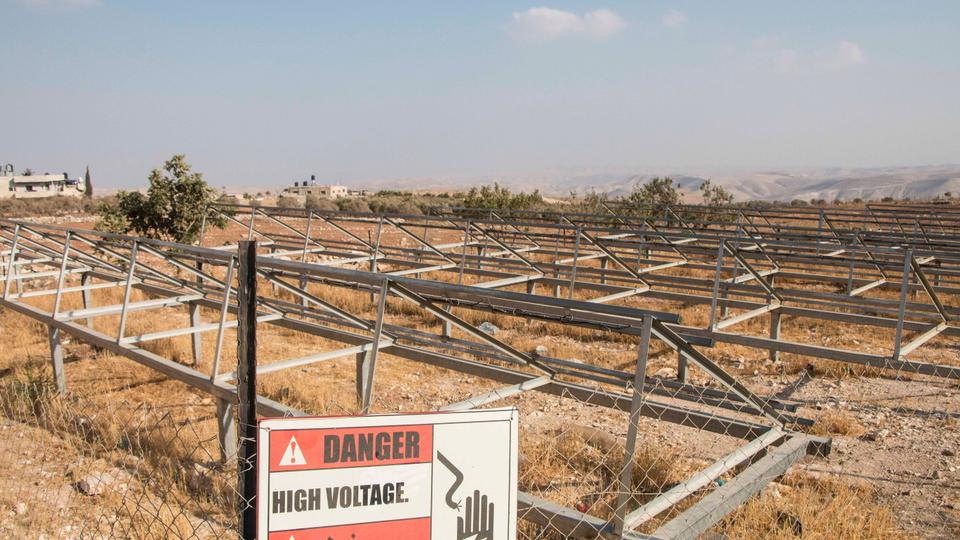 Energy non-profit Comet-ME installed solar panels, funded by the Dutch government in Jubbet adh Dhib in 2016, giving residents their own source of energy since 1929. Israeli forces confiscated 96 panels and equipment in August; 86 were returned in October. (TRTWorld) (Ylenia Gostoli)
Energy non-profit Comet-ME installed solar panels, funded by the Dutch government in Jubbet adh Dhib in 2016, giving residents their own source of energy since 1929. Israeli forces confiscated 96 panels and equipment in August; 86 were returned in October. (TRTWorld) (Ylenia Gostoli)
It was one of the humanitarian projects Israel dismantled or destroyed over the summer, when a string of high-profile incidents eventually triggered a modicum of reaction from the European Union and the member states which financed them.
At least 182 EU-funded structures, including post-demolition emergency tents, schools, latrines and animal shelters were affected in 2016, for a recorded loss of 557,378 euros – in what the EU called an “exceptional upsurge.” The trend subsided from March to August 2017, according to the EU’s own reports.
In 2016, 1,628 Palestinians lost their homes to Israeli demolitions in Area C and East Jerusalem, and more than 7,000 were affected — the worst year on record.
Homes in Jubbet adh Dhib are simple brick buildings, mostly in disrepair. The only access to Jubbet adh Dhib is a steep drive up a narrow, unlit road.
Apart from the nursery, the only amenities in the village are a grocery store, a sewing shop and a mosque. A mobile clinic visits it once a week.
For years, Jubbet adh Dhib’s children had to trek two kilometres to the nearest Palestinian village to get to the nearest school. The Israeli settlement of Sde Bar is much closer, but Palestinians are only allowed inside with special permits.
That was going to change this year, when an Italian NGO erected prefabricated classrooms near Jubbet adh Dhib to serve 60 children from two communities. The project was funded by the Belgian government.
However, a day before the school year was due to begin in late August, the Israeli army drove in and confiscated the structure, leaving behind a few chairs.
The school has since been rebuilt by the Palestinian education ministry and activists who hastily stacked up bricks in the dead of the night.
Locals now guard the school 24 hours a day. Large rocks have been scattered all along the road that leads to the school to make it difficult for vehicles — more specifically demolition crews — to access it.
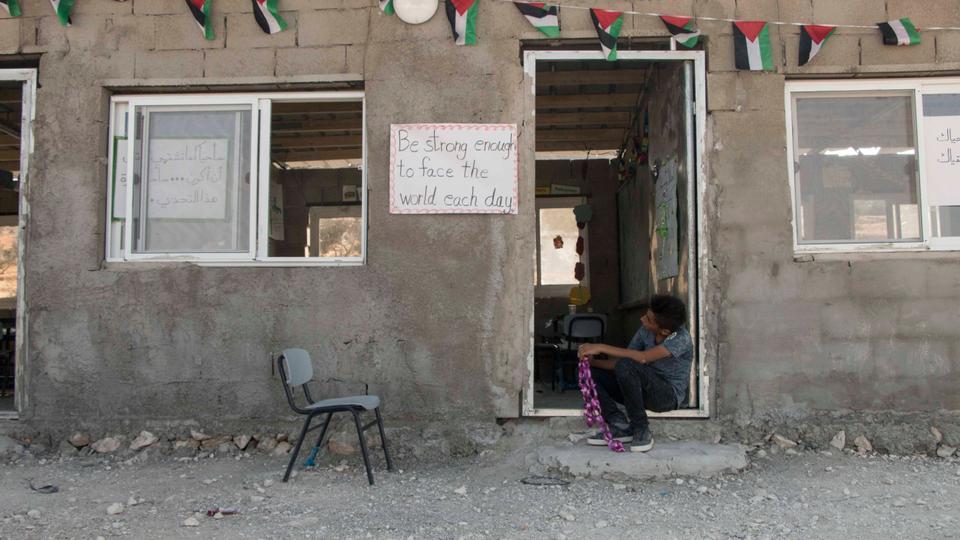 The school is one of very few amenities for the roughly 160-strong population of Jubbet adh Dhib. Others include a grocery store, a sewing shop and a mosque. A mobile clinic visits the village near Bethlehem once a week. August 2017. (TRTWorld) (Ylenia Gostoli)
The school is one of very few amenities for the roughly 160-strong population of Jubbet adh Dhib. Others include a grocery store, a sewing shop and a mosque. A mobile clinic visits the village near Bethlehem once a week. August 2017. (TRTWorld) (Ylenia Gostoli)
This was the third West Bank school affected by demolitions or confiscations in the space of two weeks in August. All are located in Area C and funded by the EU or EU member states.
Geneva-based Euro-Med Human Rights Monitor estimates that since 2001, EU aid worth 65 million euros has been “squandered” — including 23 million euros during the 2014 Gaza war. NGO workers have been quietly complaining that diplomatic efforts to stop the destruction of their projects in Area C have fallen short.
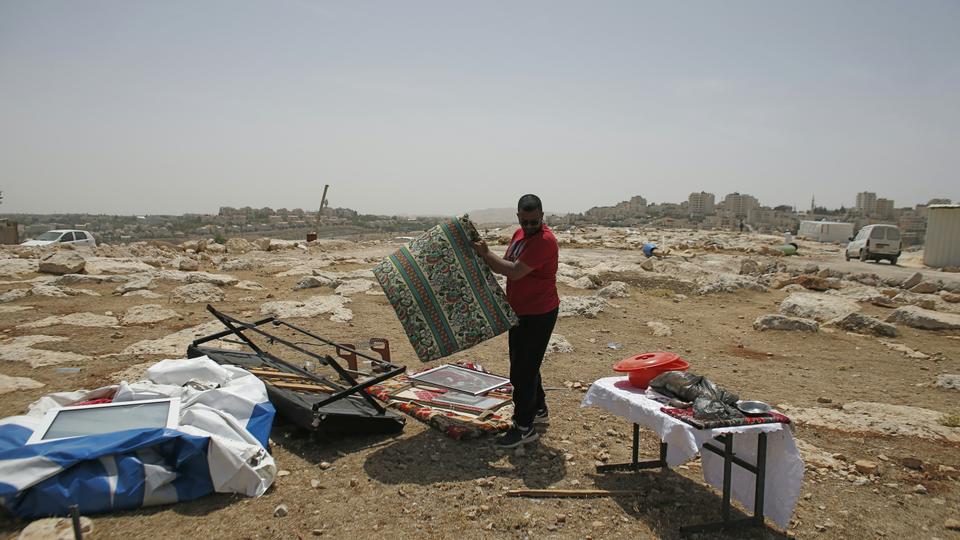 A Palestinian Bedouin man collects his belongings after Israeli Army forces dismantled a number of prefab houses, built with a donation from the European Union, in the West Bank Area B town of Al Azariya, east of Jerusalem, on May 16, 2016. (AFP) (Getty Images)
A Palestinian Bedouin man collects his belongings after Israeli Army forces dismantled a number of prefab houses, built with a donation from the European Union, in the West Bank Area B town of Al Azariya, east of Jerusalem, on May 16, 2016. (AFP) (Getty Images)
Turning the lights back on
The solar panels of Jubbet adh Dhib have been an exception.
Valued at 40,000 euros, the panels had been funded by the Dutch government. After their confiscation, Dutch officials asked Israel to return them and immediately began assessing what “next steps” could be taken, according to Israeli newspaper Haaretz.
The panels, with the exception of ten that were damaged, were eventually returned to the village on October 4.
According to Comet-ME, the Civil Administration decided to release the equipment following “legal efforts conducted in parallel with diplomatic efforts on the part of the Netherlands Foreign Ministry.”
The Dutch representation office in Jerusalem did not respond to TRT World’s request for comment by the time of publication. The dispute was not settled in court.
The confiscations are based on Article 80 of Military Order No. 378. This gives Israeli authorities ample leeway, according to the Norwegian Refugee Council (NRC), an NGO that provides post-seizure legal aid.
“Legal options are therefore limited, and prospects for reversing the structures to the intended beneficiaries are dependent on political engagement rather than litigation,” Thomas Hill, the NRC’s acting country director, tells TRT World.
When asked about recently-confiscated aid material, the Civil Administration reiterates to TRT World that it “works in accordance to the authority it possesses against illegal construction in Area C.”
In Jubbet adh Dhib, I’tidal breathes a sigh of relief that she no longer has to rely on an expensive, polluting and loud generator for electricity which costs roughly 1,200 euros per month for two hours of electricity a day.
Now children can watch TV programmes and study in the evening, while medicines and food can be stored in refrigerators, and households can receive a steady supply of tap water. As I’tidal puts it, “We can eat meat and chicken.”
Even with electricity, life in Jubbet adh Dhib remains tough. Isolated, the village has also been witnessing an exodus of young people looking for work in nearby towns and cities.
For the youth, who are more easily refused permits on security grounds, the process is even more gruelling as they smuggle themselves in and out of Israeli-controlled areas at great risk.
Newly-wed couples tend to leave for Palestinian cities and villages in Area A, in territories under the control of the Palestinian Authority, Fatma al Wash, the association’s vice-president, says.
“Around 21 families left since Oslo [the accord], mostly young people,” Fatma explains, adding that the number accounts for over a third of the families in the village.
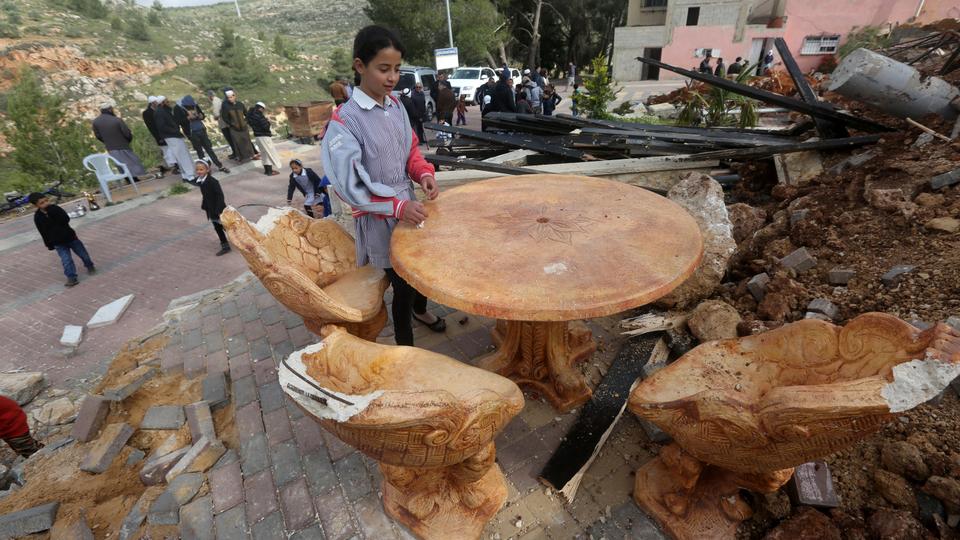 Palestinian children check the destruction in a children’s playground, that was built with funding from Belgium, in Zatarah village, south of the West Bank city of Nablus, after it was demolished on April 12, 2016 by Israeli authorities who said it was built in Area C, a closed military zone where Israel exercises full control. Israel often demolishes buildings constructed without the required Israeli permits in Area C of the West Bank, which is under full Israeli control. (AFP) (Getty Images)
Palestinian children check the destruction in a children’s playground, that was built with funding from Belgium, in Zatarah village, south of the West Bank city of Nablus, after it was demolished on April 12, 2016 by Israeli authorities who said it was built in Area C, a closed military zone where Israel exercises full control. Israel often demolishes buildings constructed without the required Israeli permits in Area C of the West Bank, which is under full Israeli control. (AFP) (Getty Images)
The cost of expanding Israel
Critics say Israel’s policies of destruction and withholding building permits are aimed at encouraging Palestinians to leave Area C, designated by the 1995 Oslo II Accords as under Israeli control pending a final status agreement.
Israeli Prime Minister Benjamin Netanyahu has publicly supported the Greater Jerusalem bill, a legislative process to annex settlements in the West Bank, further undermining the aspirations of Palestinian statehood. Calls for the annexation of Area C to Israel have been accompanied by a proposal to annex the West Bank’s largest settlement, Maaleh Adumim.
The UN says the coercive environment created by Israeli policies, including home demolitions, puts Palestinians at risk of forcible transfer — a war crime.
Following recent raids, EU representations in Jerusalem and Ramallah called on Israel to return confiscated equipment and structures.
“The EU calls upon the Israeli authorities to halt demolitions and confiscations of Palestinian houses and property in accordance with its obligations as an occupying power under international humanitarian law,” a statement read, reiterating a long-standing EU position on Area C. The EU asked Israel “to cease the policy of settlement construction and expansion, of designating land for exclusive Israeli use and of denying Palestinian development.”
But the EU and the Israeli government have diverging views on this issue.
In 2016, Netanyahu slammed what he called “the illegal construction that is taking place in the territories by the EU.”
“They’re building without authorisation, against the accepted rules, and there’s a clear attempt to create political realities there,” Netanyahu told journalists, a view espoused by several Israeli right-wing political figures before and since.
Marwan Durzi, director of the Palestinian Authority’s Area C National Coordination Office, says he welcomed recent efforts by donor countries such as the Netherlands and Belgium to demand reparations from Israel for projects they financed as “a step in the right direction.”
“Still, more action needs to be done at the international level to hold Israel accountable for its crimes,” Durzi tells TRT World. “It’s been 23 years since we signed the Oslo Agreements, and we are still waiting to have a Palestinian state. Meanwhile, Israel is building settlements and creating facts on the ground that will make the creation of a Palestinian state unfeasible, to the point where Israeli politicians speak openly of their attempt to thwart the two-state solution,” he added.
For the women of Jubbet adh Dhib, the status quo created by this system is unsustainable. They speak the unspeakable: if they could afford it, they would leave the village to find a better life for their families.
For now though, strong after a rare victory, their focus is on the immediate issues at hand.
Source: TRTWorld
 I’tidal al Wahsh (L), one of the women association’s leaders, grew up in Jubbet adh Dhib and says she saw transmission towers being erected in the Israeli settlement of Sde Bar, barely 500 metres away before it received official status in 2005. (TRTWorld) (Ylenia Gostoli)
I’tidal al Wahsh (L), one of the women association’s leaders, grew up in Jubbet adh Dhib and says she saw transmission towers being erected in the Israeli settlement of Sde Bar, barely 500 metres away before it received official status in 2005. (TRTWorld) (Ylenia Gostoli) Energy non-profit Comet-ME installed solar panels, funded by the Dutch government in Jubbet adh Dhib in 2016, giving residents their own source of energy since 1929. Israeli forces confiscated 96 panels and equipment in August; 86 were returned in October. (TRTWorld) (Ylenia Gostoli)
Energy non-profit Comet-ME installed solar panels, funded by the Dutch government in Jubbet adh Dhib in 2016, giving residents their own source of energy since 1929. Israeli forces confiscated 96 panels and equipment in August; 86 were returned in October. (TRTWorld) (Ylenia Gostoli) The school is one of very few amenities for the roughly 160-strong population of Jubbet adh Dhib. Others include a grocery store, a sewing shop and a mosque. A mobile clinic visits the village near Bethlehem once a week. August 2017. (TRTWorld) (Ylenia Gostoli)
The school is one of very few amenities for the roughly 160-strong population of Jubbet adh Dhib. Others include a grocery store, a sewing shop and a mosque. A mobile clinic visits the village near Bethlehem once a week. August 2017. (TRTWorld) (Ylenia Gostoli) A Palestinian Bedouin man collects his belongings after Israeli Army forces dismantled a number of prefab houses, built with a donation from the European Union, in the West Bank Area B town of Al Azariya, east of Jerusalem, on May 16, 2016. (AFP) (Getty Images)
A Palestinian Bedouin man collects his belongings after Israeli Army forces dismantled a number of prefab houses, built with a donation from the European Union, in the West Bank Area B town of Al Azariya, east of Jerusalem, on May 16, 2016. (AFP) (Getty Images) Palestinian children check the destruction in a children’s playground, that was built with funding from Belgium, in Zatarah village, south of the West Bank city of Nablus, after it was demolished on April 12, 2016 by Israeli authorities who said it was built in Area C, a closed military zone where Israel exercises full control. Israel often demolishes buildings constructed without the required Israeli permits in Area C of the West Bank, which is under full Israeli control. (AFP) (Getty Images)
Palestinian children check the destruction in a children’s playground, that was built with funding from Belgium, in Zatarah village, south of the West Bank city of Nablus, after it was demolished on April 12, 2016 by Israeli authorities who said it was built in Area C, a closed military zone where Israel exercises full control. Israel often demolishes buildings constructed without the required Israeli permits in Area C of the West Bank, which is under full Israeli control. (AFP) (Getty Images)






